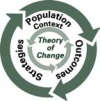| About Us |
| Background |
| Logic Model Development |
| SOC Practice Review |
| Narrated Presentations |
| Training and Technical Assistance |
| Resource Library |
| News and Announcements |
| Contact Us |
| FAQ |
| Site Map |
Background |
||
CMHS Grant Program The Center for Mental Health Services (CMHS), the federal agency within the Substance Abuse and Mental Health Services Administration (SAMHSA), US Department of Health and Human Services, provides grants for the improvement and expansion of systems of care to meet the needs of the estimated 4.5-6.3 million children nationwide with serious emotional disturbances and their families. States, communities, Territories, Indian tribes, and tribal organizations are eligible for the Comprehensive Community Mental Health Services for Children and Their Families Program. |
||
In order to maintain accountability and address the pressing need for information upon which to guide funding and policy-making at the federal and state levels, CMHS has funded a national cross-site evaluation since 1994. Macro International Inc. and Walter R. McDonald & Associates, Inc. conduct the national evaluation and work closely with several partners including the USF Logic Model Team. Read more. |
||
A "System of care" is an organizational philosophy that involves collaboration across agencies, families, and youth for the purpose of improving access and expanding the array of coordinated community-based services and supports for children and youth with serious mental health needs and their families. A method of measurement used to explore and document the degree to which service and support planning and delivery is consistent with system of care values and its approach to care is the System of Care Practice Review (SOCPR), developed by the Department of Child and Family Studies at the USF Louis de la Parte Florida Mental Health Institute. Read more. |
||
A theory of change represents the beliefs that system planners, implementers, and funders hold about what children and their families need and what strategies will enable the service system to meet those needs. Read more. |
||

